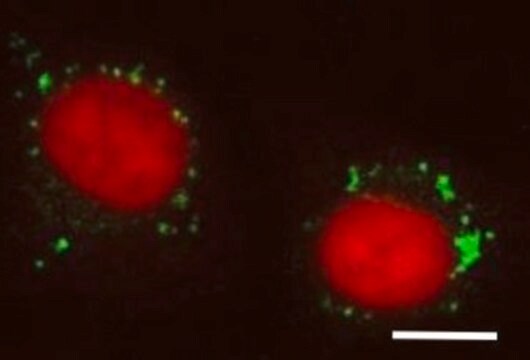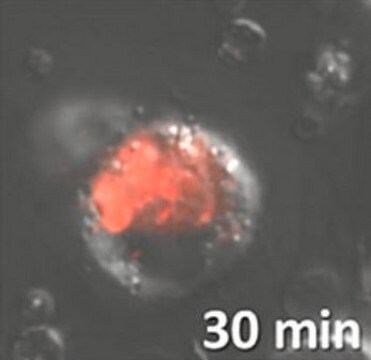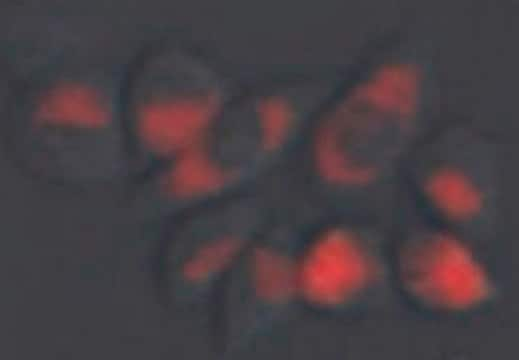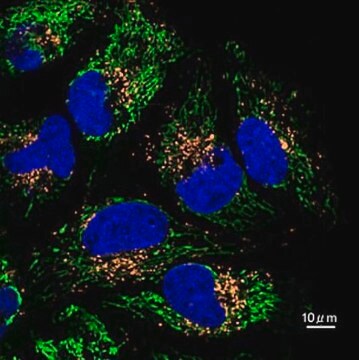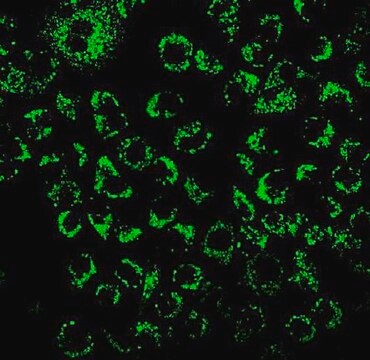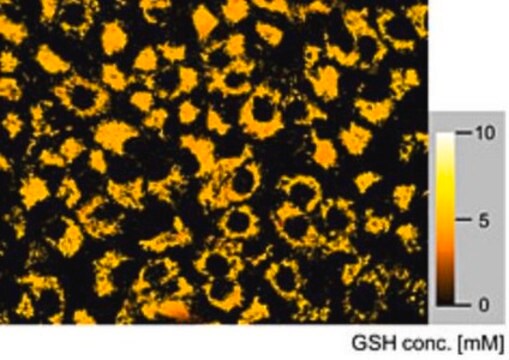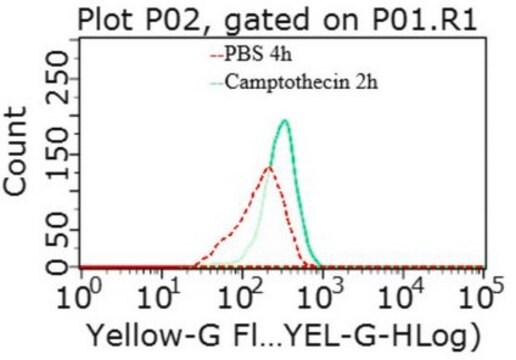SCT043
BioTracker TP-HOCL1 Live Cell Dye
Live cell imaging dye for hypochlorus acid (HOCL) used to detect phagocytosis, inflammation and cellular apoptosis.
Synonym(e):
Live cell imaging probe
Anmeldenzur Ansicht organisationsspezifischer und vertraglich vereinbarter Preise
Alle Fotos(1)
About This Item
UNSPSC-Code:
12352207
NACRES:
NA.47
Empfohlene Produkte
Assay
≥98% (H-NMR)
≥98% (HPLC)
≥98% (LC/MS)
≥98% (elemental analysis)
Methode(n)
cell based assay: suitable
Nachweisverfahren
fluorometric
Versandbedingung
ambient
Allgemeine Beschreibung
Hypochlorous acid (HOCl) is a highly potent reactive oxygen species (ROS) and helps eliminate pathogens in the innate immune system. Mounting evidence indicates that intracellular HOCl plays additional important roles in regulating inflammation and cellular apoptosis. Subcellular detection of HOCL is currently limited due to low concentration, strong oxidization, and short lifespan of the analyte.
The BioTracker TP-HOCL1 dye is a live cell two-photon green fluorescent “turn-on” imaging probe for HOCL. The probe exhibit fast response times, good selectivity, and high sensitivity towards hypochlorous acid in living cells. Acedan was chosen as the fluorescence reporting group due to its excellent photophysical properties resulting from the typical “push−pull” (amineketone) structure. 2- mercaptoethanol and 1, 2-ethanedithiol were employed to protect the ketone of acedan in the design of HOCl probes. Reaction of the probe with HOCl, which deprotects the oxathiolane/mercaptal group to reveal the ketone, would lead to fluorescence enhancement
Spectral Properties
Absorbance: 375nm
Emission: 500nm
References
Chang YT et al. Development of Targetable Two-Photon Fluorescent Probes to Image Hypochlorous Acid in Mitochondria and Lysosome in Live Cell and Inflamed Mouse. Model. J Am Chem Soc. 2015 May 13;137(18):5930-8.
The BioTracker TP-HOCL1 dye is a live cell two-photon green fluorescent “turn-on” imaging probe for HOCL. The probe exhibit fast response times, good selectivity, and high sensitivity towards hypochlorous acid in living cells. Acedan was chosen as the fluorescence reporting group due to its excellent photophysical properties resulting from the typical “push−pull” (amineketone) structure. 2- mercaptoethanol and 1, 2-ethanedithiol were employed to protect the ketone of acedan in the design of HOCl probes. Reaction of the probe with HOCl, which deprotects the oxathiolane/mercaptal group to reveal the ketone, would lead to fluorescence enhancement
Spectral Properties
Absorbance: 375nm
Emission: 500nm
References
Chang YT et al. Development of Targetable Two-Photon Fluorescent Probes to Image Hypochlorous Acid in Mitochondria and Lysosome in Live Cell and Inflamed Mouse. Model. J Am Chem Soc. 2015 May 13;137(18):5930-8.
Anwendung
Live cell fluorescent imaging
Research Category
Cell Imaging
Cell Imaging
Research Sub Category
Live Cell Dye
Live Cell Dye
Qualität
Purity: ≥ 98% confirmed by HNMR, LC-MS and HPLC and elemental analysis
Molar Mass: 258.36 g/mol
Molar Mass: 258.36 g/mol
Physikalische Form
Lyophilized
Lagerung und Haltbarkeit
Store BioTracker TP-HOCL1 Live Cell Dye at -20°C, desiccate and protect from light
Note: Centrifuge vial briefly to collect contents at bottom of vial before opening.
Note: Centrifuge vial briefly to collect contents at bottom of vial before opening.
Haftungsausschluss
Unless otherwise stated in our catalog or other company documentation accompanying the product(s), our products are intended for research use only and are not to be used for any other purpose, which includes but is not limited to, unauthorized commercial uses, in vitro diagnostic uses, ex vivo or in vivo therapeutic uses or any type of consumption or application to humans or animals.
Lagerklassenschlüssel
11 - Combustible Solids
WGK
WGK 3
Flammpunkt (°F)
Not applicable
Flammpunkt (°C)
Not applicable
Analysenzertifikate (COA)
Suchen Sie nach Analysenzertifikate (COA), indem Sie die Lot-/Chargennummer des Produkts eingeben. Lot- und Chargennummern sind auf dem Produktetikett hinter den Wörtern ‘Lot’ oder ‘Batch’ (Lot oder Charge) zu finden.
Besitzen Sie dieses Produkt bereits?
In der Dokumentenbibliothek finden Sie die Dokumentation zu den Produkten, die Sie kürzlich erworben haben.
Unser Team von Wissenschaftlern verfügt über Erfahrung in allen Forschungsbereichen einschließlich Life Science, Materialwissenschaften, chemischer Synthese, Chromatographie, Analytik und vielen mehr..
Setzen Sie sich mit dem technischen Dienst in Verbindung.